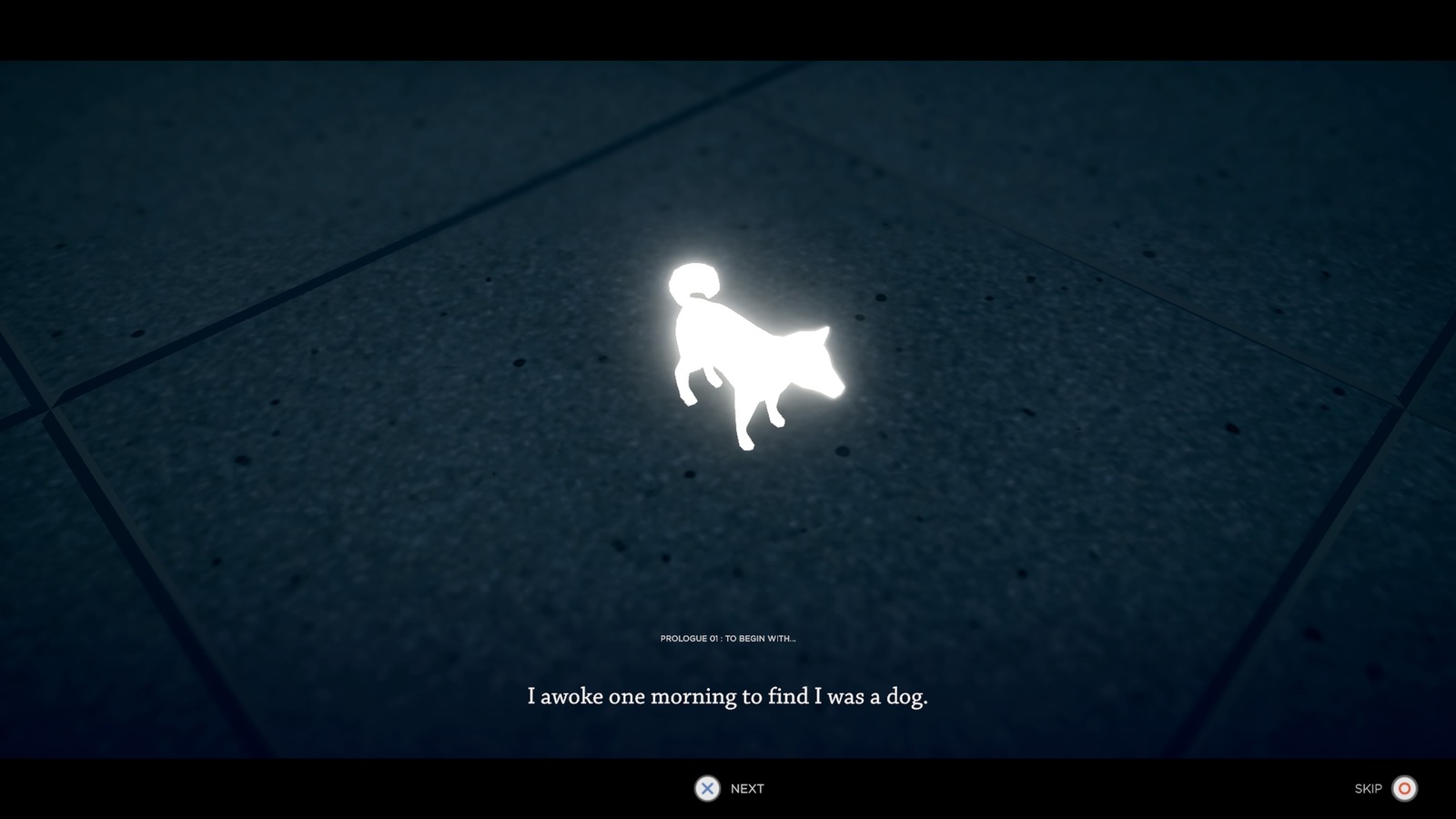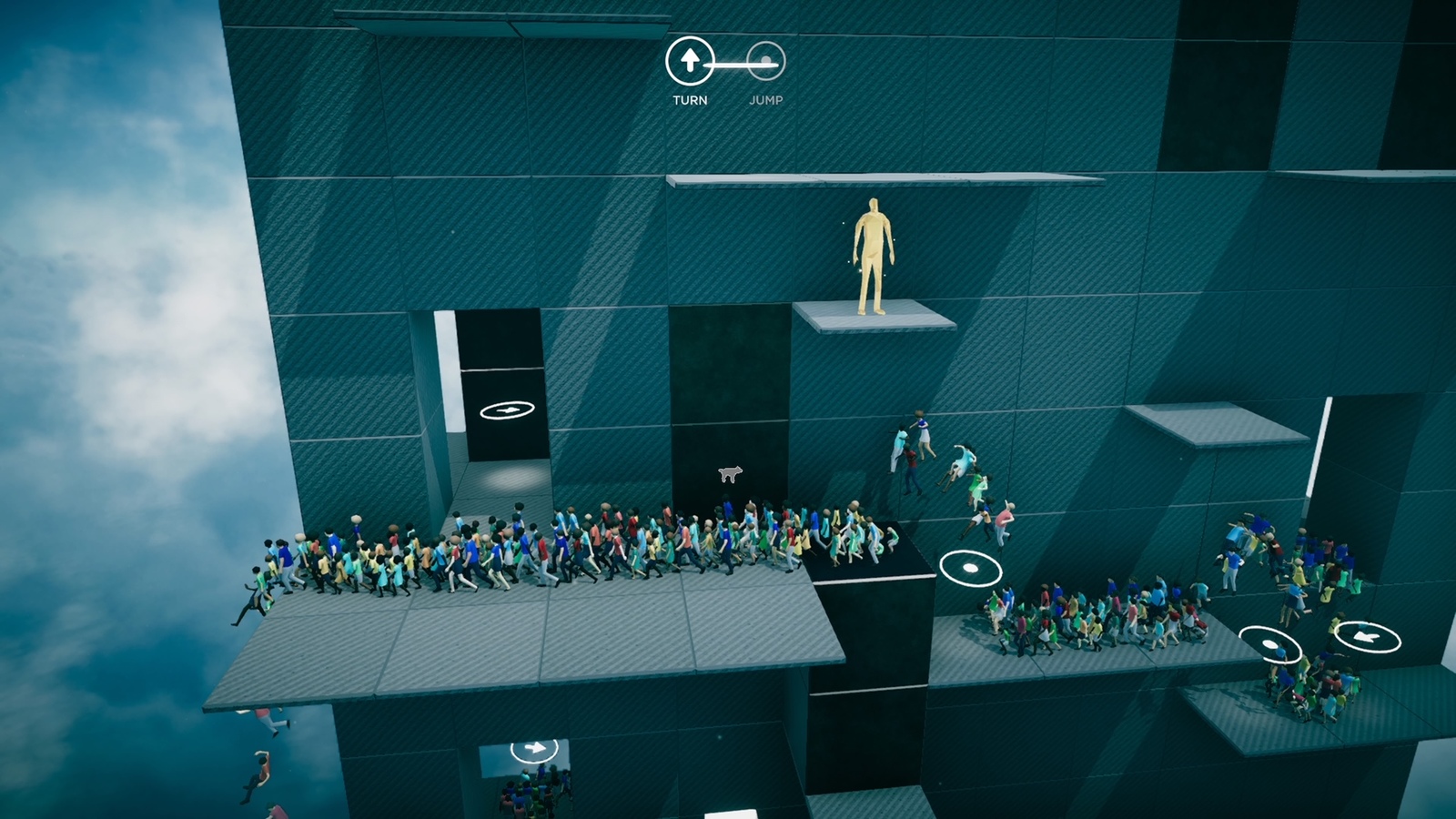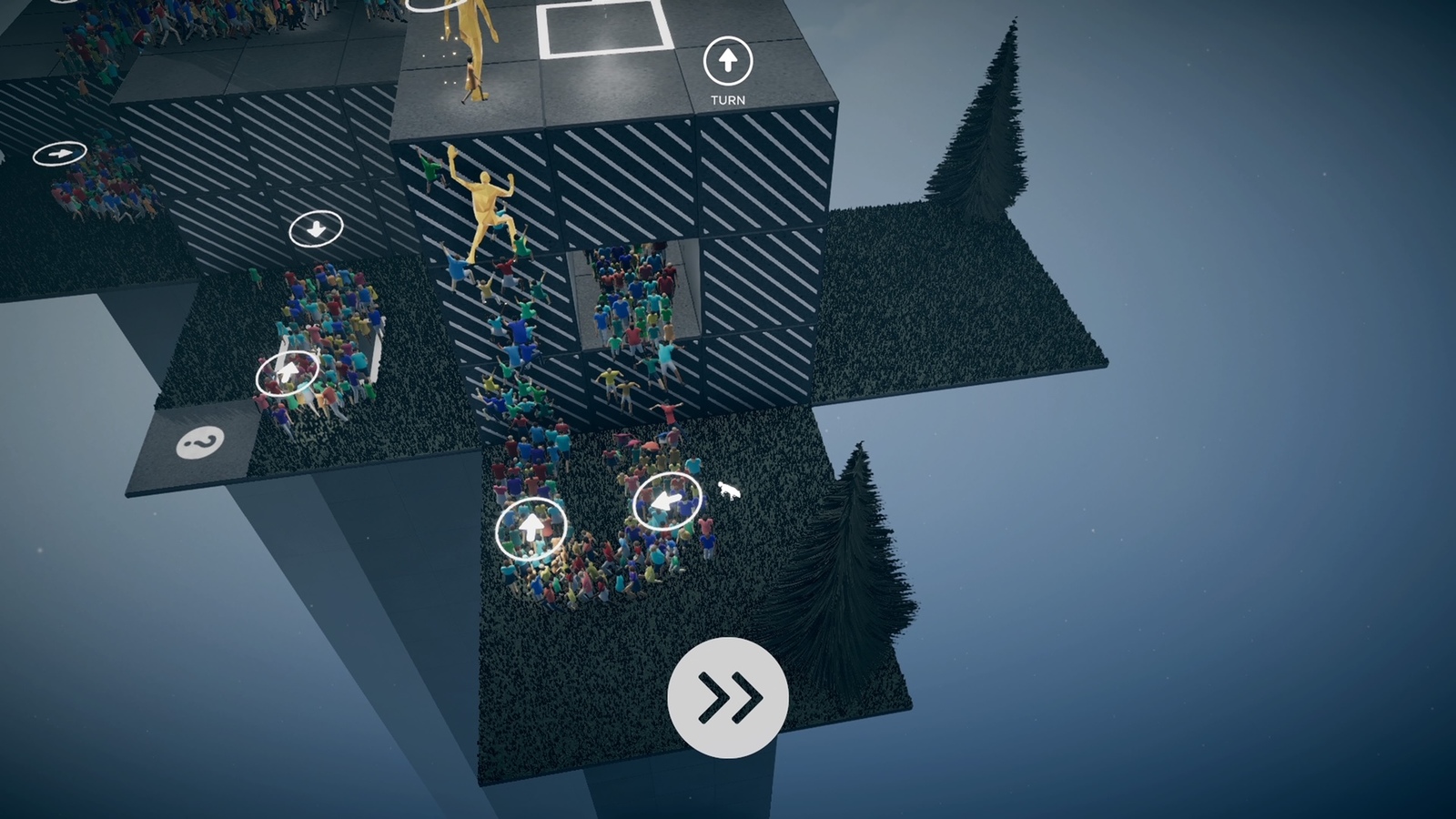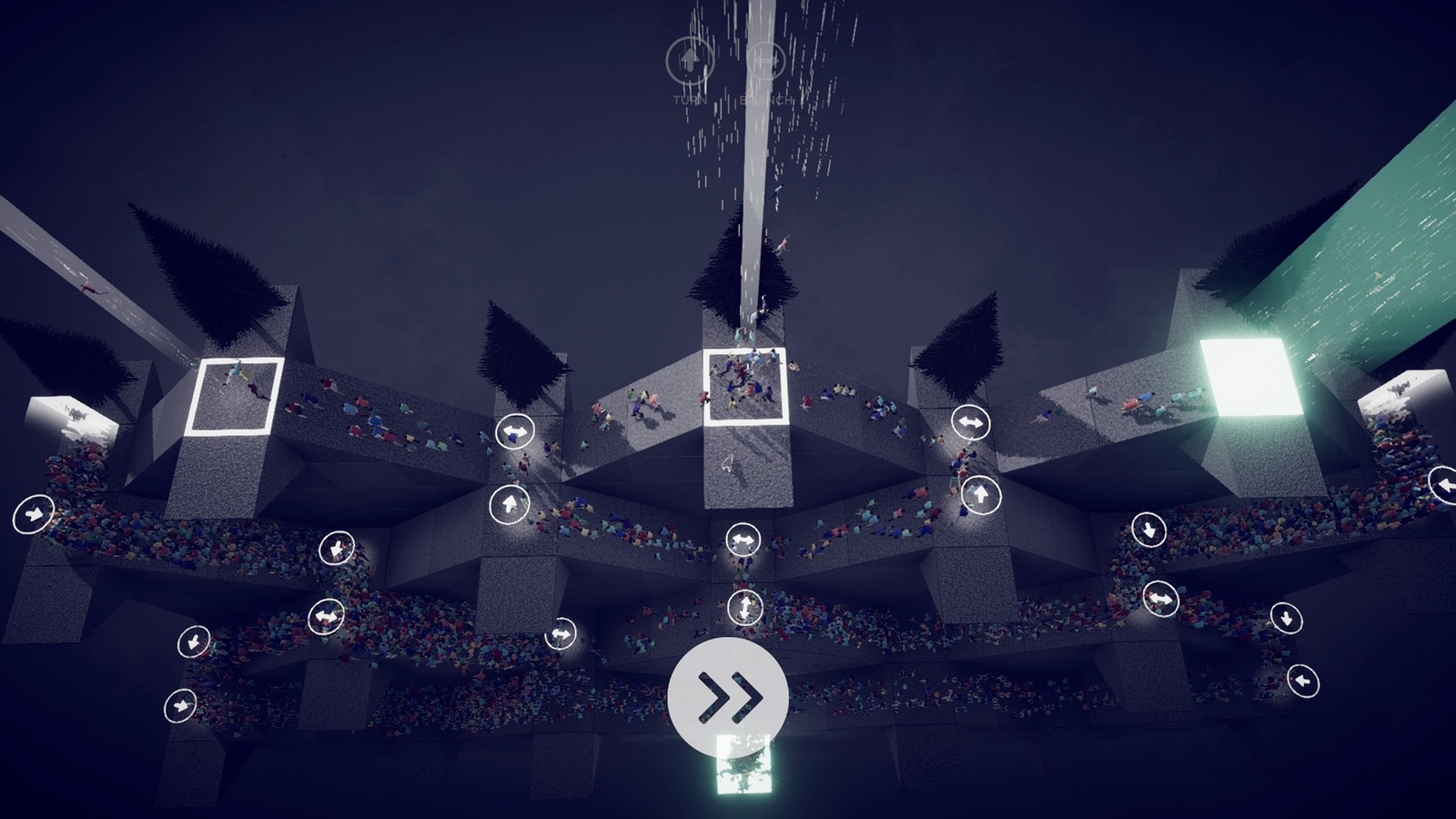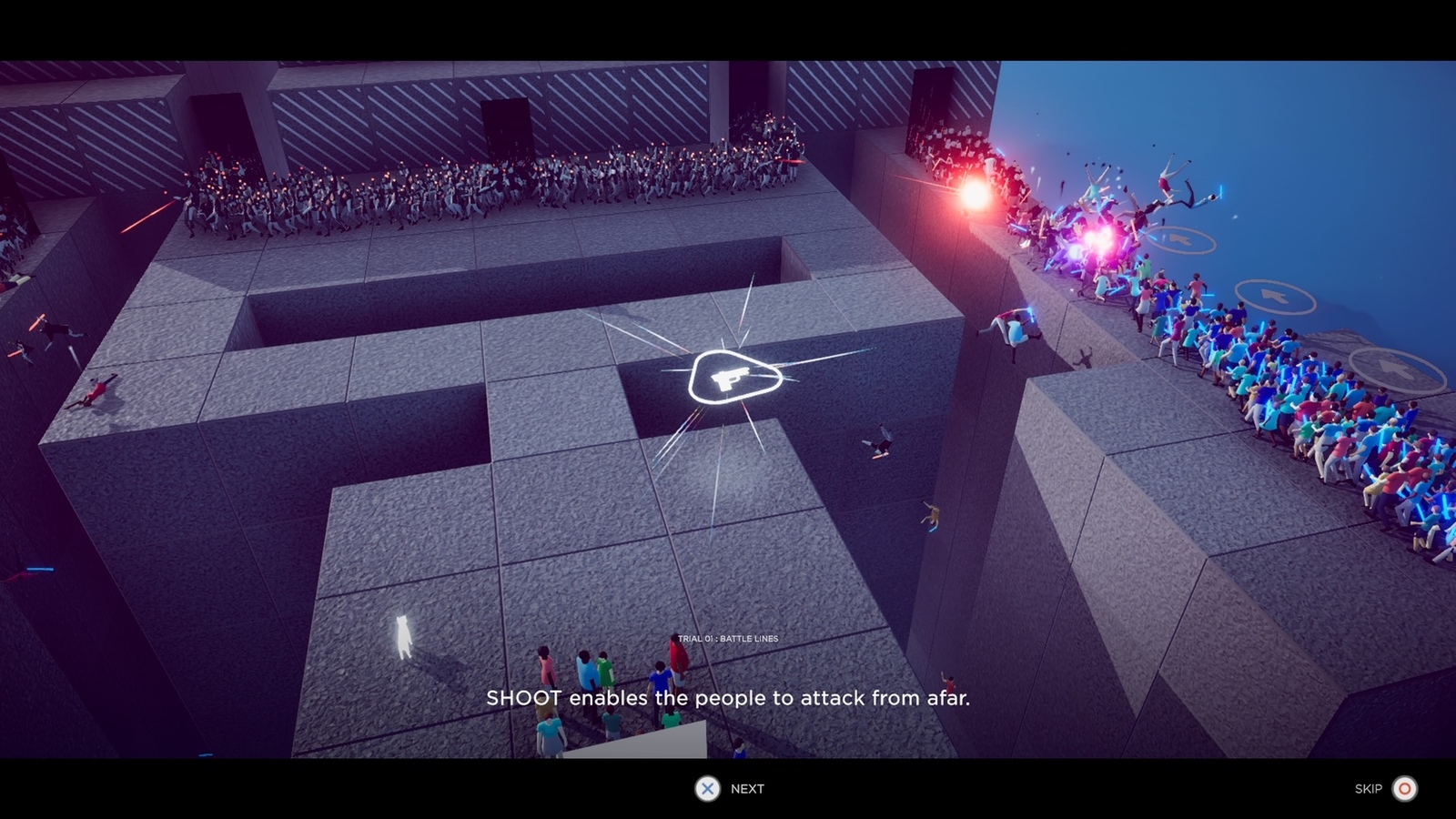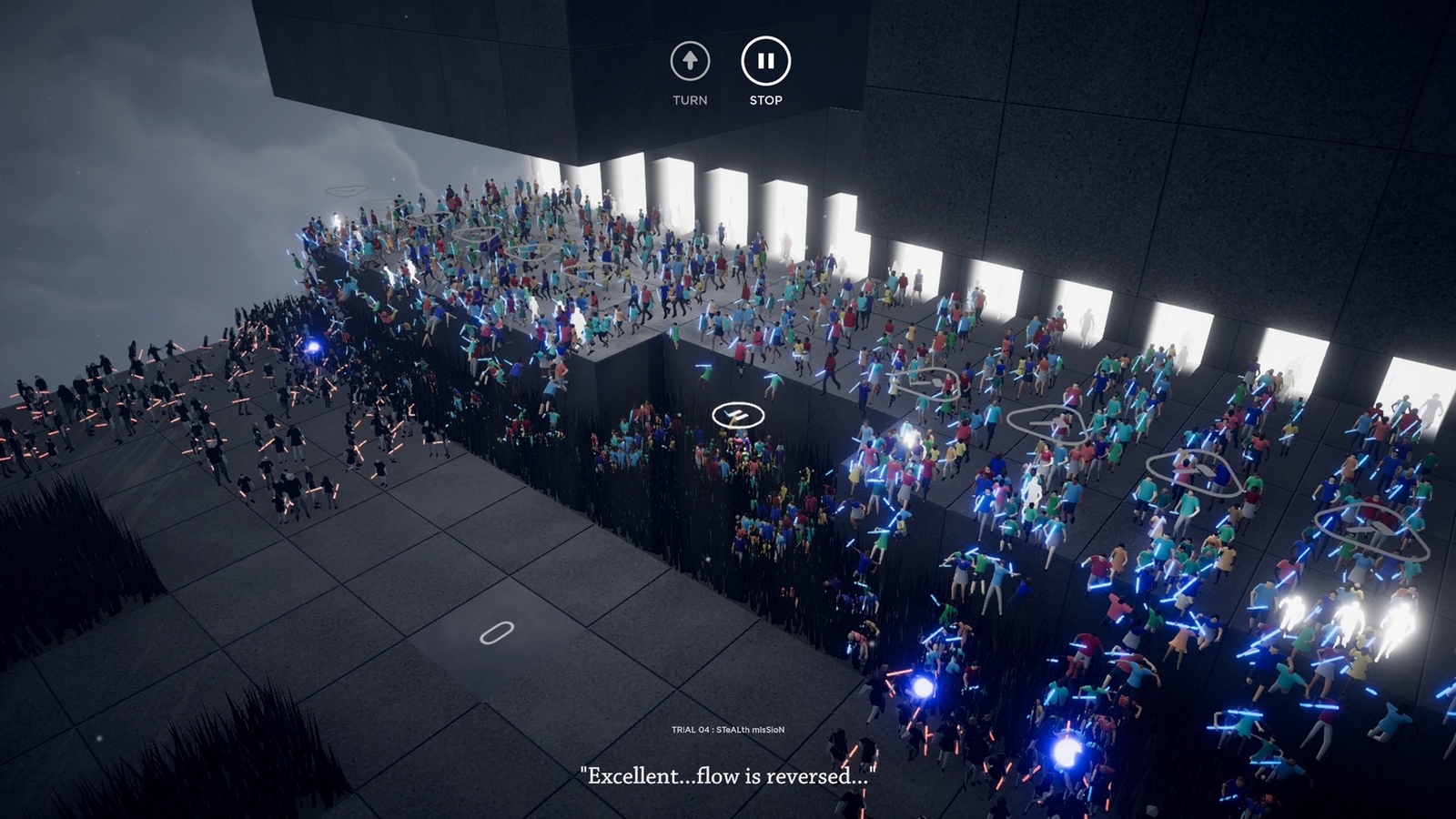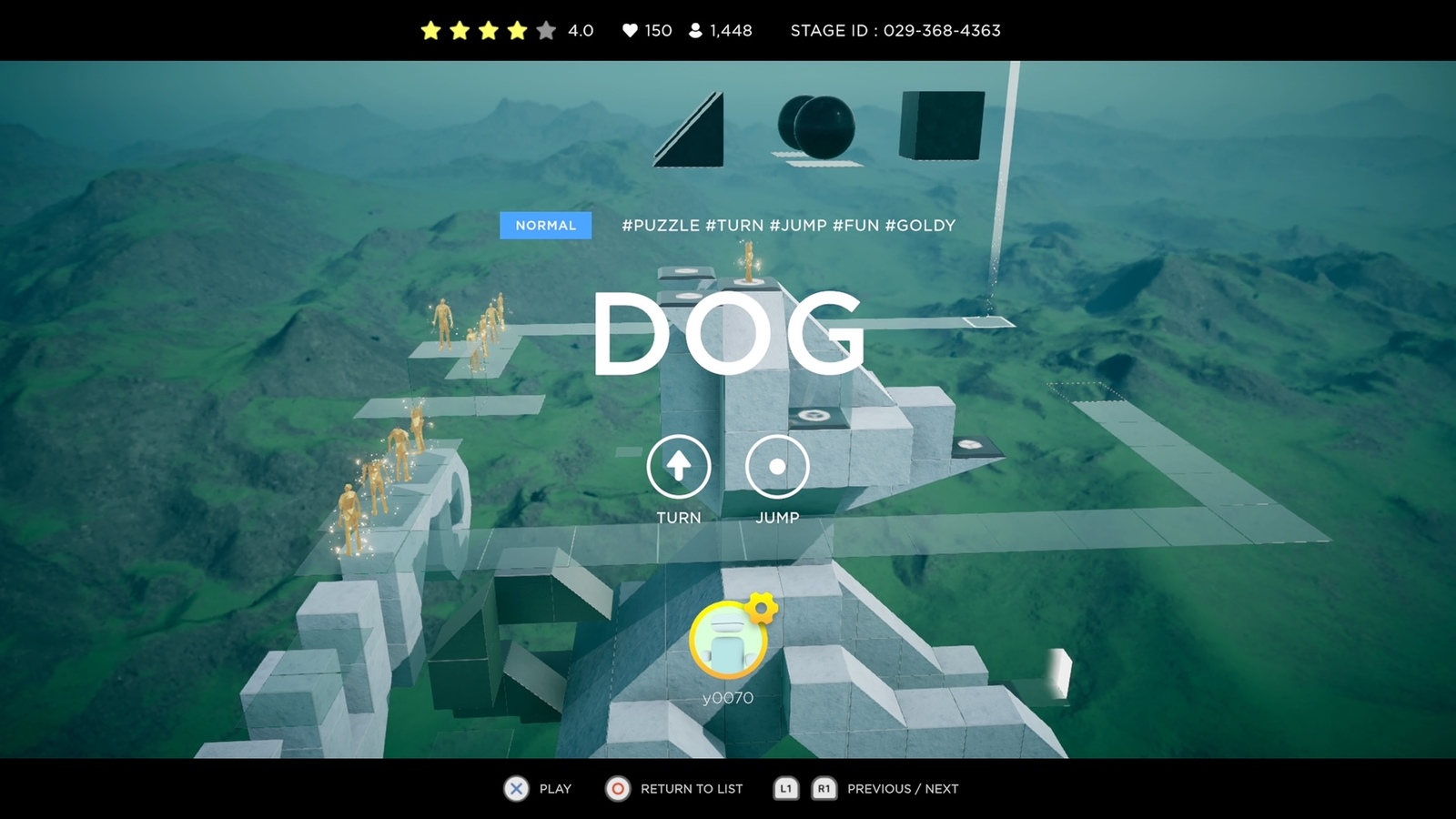I love it when a plan comes together – that’s never a guarantee. Plans fall apart for the pettiest of reasons, especially when you start throwing other humans into the mix. We all have our own theories on life and how things should be. With so much potential conflict waiting to happen, it’s a wonder that anything gets done at all. Humanity (the game, not the concept) solves this problem by uniting the world behind the one thing that just about everyone can believe in: a cute dog.
In Humanity, you literally bark orders at mankind to push them onto correctly solving puzzling “trials.” While you could then describe Humanity as a “puzzle” game, that sells it a bit short. In most levels you do solve puzzles of a sort, but the nature of those puzzles changes. Like humanity itself, Humanity evolves over time. The game you play at the start is not the game you’ll be playing by the end, or even the game you’ll be playing after the first few handfuls of levels.
Things start simple. Humans spill out endlessly from a glowing door, ready to accomplish great things, and walk straight off a cliff. Relatable, but not ideal. Luckily, you can scamper around the area placing directional arrows that change where your lemming-esque people go. If you play your directional cards right, you’ll lead them to the exit and move onto the next stage. Plenty of obstacles complicate this goal, but that’s the gist of the game.
Conceptually, the game never stagnates. Most levels introduce clever new elements, either through their layout or an additional mechanic, that lead to even cleverer puzzle design. Optional collectibles known as “Goldys” stretch your understanding of the puzzle mechanics, often requiring you to reinvent how you were using a mechanic or micromanaging your humans to a much higher degree than you would otherwise.
The pace of it all prevents you from being overwhelmed in these early stages. While humans infinitely spawn forth, you don’t need to feel pressured to keep them alive. You won’t fail if they go the wrong way or get destroyed – they will just loop away from the infinite void and back out the door they initially came from. This system encourages you to experiment and observe. Whenever I got stuck, my go-to tactic was to simply take a step back and people watch. I actually use this strategy for when I’m stuck in real life, too, but the solutions in Humanity come a little easier if we’re being honest.
When you hold so much power over others, you risk getting a big head about it, like you’re some kind of god lording over the peasants. A lot of puzzle games tend to go that route by making you into some disembodied presence that bestows your in-game peons with all of the answers to life. Humanity avoids this by making you a direct participant in the level as a dog.
The dog grounds you in reality; it can’t go everywhere or do everything on its own. If you want to scope out a portion of a level, you need to physically go near it. You need to manually jump over gaps and sometimes you’ll even need to use your humans to reach areas you wouldn’t be able to on your own. Dogs don’t necessarily have it as hard as humans, but we’re united in our need to do the bare minimum to get through life.
By keeping you grounded, Humanity injects a hands-on feel to the puzzle solving. Because you yourself are physically present in the level, you connect more to the moment-to-moment situation. This works both for providing an interesting twist on the puzzle mechanics as well as for what the narrative aims to convey. Despite the extra fur, you’re not so different from the humans you string along.
If Humanity stayed like this, it would be a solid puzzler on the merits of this formula alone. It offers a nice blend of relaxed problem solving with just enough interactive elements to keep you engaged in the moment. What makes Humanity truly remarkable is that this handful of paragraphs really only scratches the surface of the game.
The initially relaxed puzzler twists over time, broaching a variety of different genres. Each new set of levels recontextualizes the basic foundation of the game into situations that resemble action games, stealth games, strategy games, and so on. Your dogsona bobs back and forth between mildly detached strategist and actively leading the charge as their war general.
All of the dramatic shifts in gameplay add layers to experience. It’s not unlike interacting with those pesky humans in real life. The more time you spend with these creatures, the more sides of them you see. It’s all made more impressive by the fact that no matter what form the game takes, you’re still basically just leading humans to the goal like you were from the beginning. Humanity examines its basic concept from seemingly every angle and pushes it about as far as it can go.
Expanding the scope of the game does come with some growing pains. Overall, I like that the game changes so much, but these changes also shift the overall feel of it in ways that may make the early game feel misleading. You can initially solve problems in a very logical way. If you trek through the stage, you can more or less visualize the different commands you need to place just by thinking things through. As the game progresses, however, logic gives way to experimentation.
Many of the new mechanics trade straightforward functionality for ambiguity. One chunk of the game asks you to equip your humans with either swords or guns. While there is a logic to what weapon works best for each situation, fully uncovering the scope of that logic takes a few tries. Not only that, how you direct and place your humans makes just as big of an impact as your weapon choice does. In the latter half of the game, I found myself trying out different approaches far more often than I was planning them out ahead of time. Basically, your role shifts from strategist to scientist as you gather information through trial and error.
Dialogue throughout the game openly acknowledges the need to repeatedly fail – in fact, it’d be fair to say that the game openly embraces this idea. The soundtrack creates an odd, repetitive ambience that mentally locks you into the game. As I failed, my brain often tempted me with the consistent feeling of “oh, maybe if I did this one thing a little differently…” that continually pulled me into trying “just one more time.”
It’s an addictive experience, but also an exhausting one. I found that I enjoyed Humanity best in occasional chunks spread throughout frequent breaks. A little time away refreshes your brain and will often open up new ways of thinking that you might otherwise miss if you stay locked in for too long.
That’s not a bad thing, in fact it’s great to see a game made to be enjoyed over a period of time rather than all at once. In an age where we are constantly assaulted by an impossibly large catalog of new games, it’s easy to feel pressured to rush through it all as fast as possible in a futile attempt to clear the backlog. Humanity puts forth the argument that maybe we should just chill out and take things one step at a time. Rushing through Humanity would do the game’s intelligent design a disservice.
Speaking of intelligent design, sometimes I worry about these humans. It doesn’t happen often, but they will occasionally break free from their paw-printed programming and go off-course. This can lead to them mucking things up by pushing a block they’re not supposed to or something equally disastrous. While I appreciate the miracle of nature that is free will, I clearly know what’s best for these dummies so they should just do what I say. I suppose that this is how dictatorships start.
Luckily this isn’t as annoying as it sounds. Most of the time the human’s newfound sentience only arises when too many of them bunch up into one location. When you know when to expect them to get unruly, you can plan for it. Sometimes, however, things will just happen in the chaos of adding and removing tiles, so accidents will happen. I hesitate to call this an outright flaw because in a way, that’s life, right? This is a game about humanity and humanity is all about the occasional accidents. Embracing humanity means embracing both failure and success.
I don’t mind accepting some errors, but sometimes it can feel overbearing. That’s life, too. Early on, you unlock the ability to restart a level with your direction tiles intact, which cuts down on the pain of needing to start over. Some of the later stages hardly use the directional tiles, however, so retrying them becomes a much more tedious affair. Since a bunch of levels rely on experimentation, it gets annoying to have to perform the same handful of steps over and over to try one new thing. I’m only really thinking about a small handful of stages where I ran into this issue, but I do wish there were some option to level the pain of retries in a way that covered the entire game more evenly.
Even with some flaws, the best-laid plans of Humanity come together in the end. Humanity explores its concepts so thoroughly and creatively that it’s hard to even imagine what a sequel would look like. That makes it all the more impressive that beyond the main game, Humanity also gives the option for virtually infinite content via its level creation and sharing system.
I tried my hand at both playing and creating, and found them both to be surprisingly intuitive. With mechanics as eclectic as Humanity, you can go into these user-made levels with all kinds of ambitions. Both the level curation systems and the builder tools accommodate that, with plenty of resources for finding exactly what you want to play or build. All of this is to say that Humanity is a big game that will last as long as you want it to.

